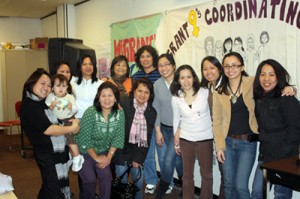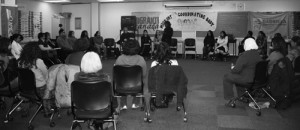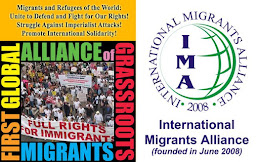The Asia Pacific Mission for Migrants (APMM) is one with the exploited women of the world in the commemoration of the 100th year of the International Women's Day and in their continuing fight for comprehensive rights in society.
Many of such oppressed women are migrant workers and immigrants including those who are undocumented or in an irregular status. Their conditions have been exacerbated by the failure of neo-liberal globalization and have led to more discriminatory and restrictive policies imposed by governments of labour importing countries.
One such policy is the national verification scheme of Thailand which is a guise to set the stage for a massive crackdown on undocumented foreign workers and refugees which already started in March 3. This would affect a million and a half persons, most of who are from Burma.
In the Middle East and in Taiwan most of those who run away from their employers are female domestic workers who were abused. Instead of being accorded protection and assistance by government authorities, those who were accused by their employers of absconding in the Middle East end up being jailed instead.
While in South Korea, Macau, Malaysia and in many other countries there is no let up in the intensification of the crackdown on undocumented migrant workers many of whom are women. Being in an irregular status makes them criminals in the eyes of these governments. And they have no rights whatsoever and physical and sexual abuse on them is done with impunity.
Even those who offer humanitarian assistance to them like food and shelter are likewise categorized as criminals. In Macau there is a new law being discussed that would make it a criminal offense for one who rents out a flat to undocumented migrants. Ironically, there is another law set to take effect on April 26, 2010 that would push migrant workers to become undocumented. This pertains to a provision which stipulates that if a non-resident worker initiates the termination of a contract without just cause he/she would be banned to work in the territory for 6 months.
Ironically, some of the countries in the region that are some of the most vicious to attack the rights of women are also in the ASEAN formation that will soon come up with a regional instrument on the rights of women and children.
Indeed the lives of these women who toil far from their shores are almost similar to the conditions of working women in industrially developing countries 100 years ago. There is still a lot of effort needed to be done in organizing and empowering migrant women workers including those who are undocumented and in encouraging more people to advocate their cause. Examples of this include the member organizations of KASAMMAKO (a Filipino alliance) and the formation of the Migrants Trade Union (MTU) both in South Korea.
Other than this, we shall advance and continue to develop unities achieved in the formations like the AMMORE or Action Network for Marriage Migrants Rights and Empowerment, the network on undocumented migrants and the Migrants Caucus on the ASEAN
We shall also push the advocacies on domestic workers of the United for Foreign Domestic Workers’ Rights (UFDWR) and contribute to the strengthening and expansion of the International Migrants Alliance or IMA.
We enjoin all grassroots women to actively take part in the establishment of the International Women’s Alliance in August this year. The formation of the IWA shall be another important milestone in the continuing struggle of women for emancipation.
Until the cause for freedom and social justice is achieved, the fire that started in the first International Women’s Day shall continue to burn in the oppressed women of the world,
March 8, 2010
==============================
Asia Pacific Mission for Migrants (APMM)
G/F, No.2 Jordan Road, Kowloon, Hong Kong SAR
Tel. no.: (852) 2723-7536
Fax no.: (852) 2735-4559
General E-mail: apmm@hknet.com
Other Email Addresses:
Managing Director : director@apmigrants.org / rbultron@gmail.com
Advocacy Program : advocacy@apmigrants.org / rbultron@gmail.com
Research and Publication: publications@apmigrants.org / ahc@hknet.com
Women's Program : women@apmigrants.org / ecbuhay@gmail.com
WEBSITE: http://www.apmigrants.org
"We dream of a society where families are not broken up by the urgent need for survival."
"We dream and will actively work for a homeland where there is opportunity for everyone to live a decent and humane life."
Sunday, March 7, 2010
Thursday, March 4, 2010
INTERNATIONAL WOMEN’S DAY: Strengthening the Voices of Migrant Women
March 1, 2010
By Pet Cleto
Participants in the Migrant Women’s Coordinating Body for International Women’s Day education session on women’s struggles in Toronto.
The Migrant Women’s Coordinating Body was organized three years ago by women who aimed to strengthen the voices of migrant women and make them an important force for change in Canadian society. Its member organizations are: GABRIELA, Migrante-Ontario, BASICS Free Community Newsletter, Thorncliffe Neighbourhood Office, Justice 4 Migrant Workers, METRAC, Canadian HART, SAWRO, and CUPE Local 4308.
While the first education day (January 21, 2010) focused on international and liberation struggles of the various countries from which migrant women workers come from, the February education day highlighted women’s struggles in Toronto and Canada.
Xolisiwe (Connie) Ndlovu, now the Vice-president of CUPE Local 4308 and a personal support worker, is a refugee from Zimbabwe. She spoke of her fight, since 2002, against the obstacles put on the path of many newcomers by class conflict, racism, and imperialism. Her story starts, like most newcomer stories start, with the demeaning of her previous education and work experience. In her union work, she now challenges issues produced by racism and class-conflict: low wages, lack of benefits and inadequate sick leaves. A strong advocate for equality and equity in our society, she sees the oppression inflicted on women and children today as a violence that is done in the name of “capitalism”.
Amber O’Hara spoke about Canada’s missing or murdered aboriginal women, in whose honour she has dedicated her 18-year long work of research and documentation. The women victims now total 800 in her list, and most of their cases remain unresolved. In 1993 she formed Manitou Kwe singers, a women’s hand drum group which performs specifically these aboriginal women and as well, for justice for people in prisons. Her activism is also driven by a personal loss: the murder of her cousin Carolyn Connolly on August 2, 2008.

Nine organizations were represented in the education day of International Women’s Day held in Toronto on Feb. 21, 2010.
However, the fundamental changes that Migrante has raised and brought to the attention of politicians still await some government action. Among them: permanent residency upon arrival, the un-locking of LCP workers from the two-year live-in requirement, and the ratification of the ILO Convention for Migrant Workers and their Families (which would give migrant workers equal rights as workers who are native to the migrant workers’ “host countries”).
The South Asian Women’s Rights Organization (SAWRO) was represented by Sultana Jahangir, who very vividly described the different specific forms that imperialism and capitalism take in the lives of migrant and newcomer women. She called upon everyone to continue sharing their experiences, and to join their hands together in order to advance their common objectives.
Speaking about her work at the Thorncliffe Neighbourhood Office, Ambreen Akbar also gave testimony to the numerous instances when exploitation and oppression have made, and continue to make, the lives of women almost unbearable.
The Migrant Women’s Coordinating Body welcomes the public to its cultural celebration on Friday evening, March 5, Friday, at the Steelworkers’ Hall, in honour of women’s struggles and victories. On International Women’s Day this year, on Saturday, March 6, it will lead a contingent of workers’ groups, grouping together in front of the Ontario Institute for Studies in Education at 252 Bloor Street West, to join the IWD march as a valiant voice of migrant women workers in Canada. A potent voice for the liberation of Canada’s migrant women has risen.##
INTERNATIONAL WOMEN’S DAY: Strengthening the Voices of Migrant Women
Subscribe to:
Comments (Atom)
